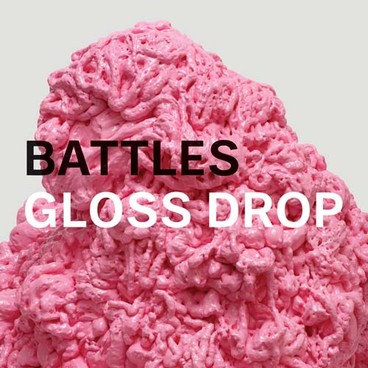Two big questions face Battles as they release Gloss Drop: how does it compare to the widely-praised debut Mirrored, and how do they fare now that Tyondai Braxton – the man behind their most obvious innovations – has left the band? Both are answered succinctly. Gloss Drop is a more playful and less condensed album, allowing the remaining trio to work at full stretch.
They don’t dive straight in to every song, and on opening track ‘Africastle’ the most exciting moments are characterised not by virtuosity but by absence. It begins with a pulse, throbbing until John Stanier’s drumming kicks in. From here it jerks and strides, then swoops and soars. After a rapid-fire drum roll that should, by rights, end with a cymbal bashing, we get a second’s break and a single low note on the keyboard: plonk. It’s momentary but thrilling, before a dramatic three-note closing riff. Again only the first two notes are underpinned by a drumbeat. That last note, initially unaccompanied, beckons you an inch closer each time.
Braxton’s absence on vocals is redressed by four guests. The big name is Gary Numan, found amidst the dystopic, race-for-the-train clatter of ‘My Machines’. Kazu Makino enjoys a cute and breathy turn on the springy ‘Sweetie & Shag’, contrasting with the oddest vocal of the lot: Yamantaka Eye on closing track ‘Sundome’. Here it’s as if Battles set out to cross Leftfield’s ‘Afrika Shox’ with an ice-hockey arcade game. Gloss Drop is packed with ideas, but instead of clambering over one another the riffs, rhythms and basslines co-operate more gracefully, with a greater degree of harmony.
‘Futura’ is the best example of Battles’ layered approach to song-building, and of what people tend to dislike about the band. It offers the hypnotic pleasure of watching clockwork in action, or the precise cause-and-effect displayed in those Honda television adverts from a couple of years ago. This is where detractors say that Battles are heartless, robotic, favouring delineated pictures of digital precision at the expense of more emotive watercolour blends.
But tracks like ‘Futura’ are not clockwork, and Battles aren’t a MIDI band. To call Battles mechanical is to make the same mistake made by people who praised the chess-playing computer Deep Blue for defeating Russian grandmaster Gary Kasparov. Only a few appreciated Deep Blue’s victory as a victory of computer programming and design. That is to say, a human triumph. While Braxton’s departure might literally have forced guitarist Dave Konopka towards the front of the stage, John Stanier remains the steam in the engine: an exacting and inventive drummer who could, I’d wager, concoct more inventive patterns than any algorithm. Even the most mechanical-sounding Battles song has been written, not engineered.
Nowhere is this more evident than on ‘Ice Cream’, beginning with a chaotic jumble of absurd grunts from Kompakt Records’ Mathias Aguayo and a scattered riff, creating the same happy anticipation that comes with watching a toddler wind the crank on a jack-in-the-box. The same joy, too: once you’ve seen the zesty, multi-coloured montage video produced by Spanish collective Canada, it’s impossible to divorce the song from the exuberant visuals. If it doesn’t make you smile, there’s every chance you’re the robot.
There are, however, comparative lulls. After the halfway mark, ‘Dominican Fade’ seems like an intermission, a percussive passage that’s drifted in from the Caribbean Coast. It’s pleasant but directionless when compared with the more dynamic instrumentals ‘Wall Street’ or ‘Inchworm’. Similarly ‘Toddler’ amounts to little more than an assembly of peeps and chirps. But Battles are fond of this sort of thing, and ‘Toddler’ leading into the more forceful ‘Rolls Bayce’ recalls the way ‘Prisimism’ bled into ‘Snare Hanger’ on Mirrored. This re-emphasises their interest in the kind of automated improvisation that marked them out as innovators with the release of their first EPs.
And it’s from there that we can see the band’s development and strengths. They once corralled roaming ideas, and on their first album firmed them up into songs that suffered from a surplus of invention. Stanier has explained that as a quartet they often found themselves ‘competing for real estate’. That’s evident now that we have Gloss Drop. In places, Mirrored simply overdid it. Battles have undoubtedly suffered a loss, but they join the rank of charmed bands that have lost a key member then recorded a superior album.


